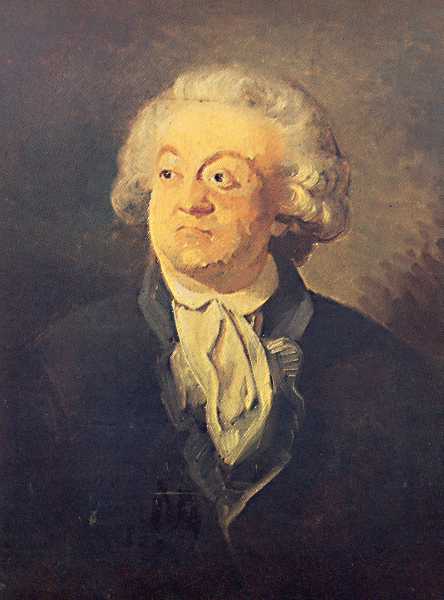The directory «Plots»
Mirabeau Honore-Gabriel Riquetti
(1749—1791)

A fine, very scarce, imposing, full length portrait of the aristocratic revolutionary, politician and orator Honore-Gabriel Riquetti Mirabeau. This proof state shows evidence of scratching out and incomplete shading. He stands, gesturing dramatically, in a colonnaded hall, with statues and bas-reliefs of Liberty in the background, wearing a black brocaded suit, ruffled shirt and black handkerchief in one hand. A wild and spendthrift youth, Mirabeau spent many of his early years locked up in various prisons under lettres de cachet issued by his father, the Marquis de Mirabeau. An avowed enemy of despotism, Mirabeau nevertheless at first tried to be elected a delegate for the nobility of Provence, at the summoning of the States-General in 1789. He was however, rejected as he held no fief, and was forced reluctantly to turn to the Third Estate. He led the Third Estate into setting up the National Assembly, of which he became President in 1791, all the time secretly intriguing and mediating with the Court. Sincerely believing in a constitutional reformed monarchy, Mirabeau's problem was to know how and for how long his Machiavellian game could be continued before his intrigue with the court would be exposed. Trying to justify himself to the Jacobins, the newspapers of the left redoubled their accusations of treason against him, and in March he experienced some notable reverses in the Assembly. Death may have saved him from political defeat. Gravely ill since his Presidency of the Assembly, he worsened his condition by excessive indulgence. He took to his bed on March 27th 1791, and died a week later. The people's grief for him was boundless; he was given a magnificent funeral; and it was for him that the new Church of Sainte-Geneviève was converted into the Panthéon, for the burial of great men. In the insurrection of Aug. 10th 1792, however, papers proving Mirabeau's relations with the court were found in an iron chest in the Tuileries Palace, and on Sept. 21st 1794, his remains were disgracefully removed from the Panthéon by order of the Convention.
Burkina Faso, 1989, The Tennis Court Oath
France, 1939, The Tennis Court Oath
France, 1989, Mirabeau in General States
France, 1989, The Tennis Court Oath
Guinea, 1989, Bailly and The Tennis Court Oath
Guinea, 1989, Mirabeau at Royal session
Guinea Bissau, 1989, An Officer swears Alligeance to the Constitution
Madagaskar, 1989, Mirabeau at States General
Madagaskar, 1989, The Tennis Court Oath
Maldives, 1990, An Officer swears Alligeance to the Constitution
Maldives, 1990, The Tennis Court Oath
Niger, 1991, Honore de Mirabeau
Pakistan, 1989, The Tennis Court Oath
Rwanda, 1990, The Tennis Court Oath
Rwanda, 1990, Trial of Louis XVI
Togo, 1989, The Tennis Court Oath
UNO (Geneva), 1992, The Tennis Court Oath
France, 1989.02.25,  Bignon Mirabeau. Mirabeau
Bignon Mirabeau. Mirabeau